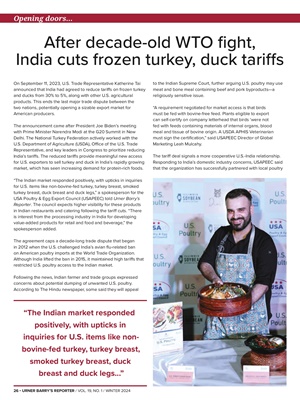
26 • URNER BARRY'S REPORTER / VOL. 19, NO. 1 / WINTER 2024
On September 11, 2023, U.S. Trade Representative Katherine Tai
announced that India had agreed to reduce tariffs on frozen turkey
and ducks from 30% to 5%, along with other U.S. agricultural
products. This ends the last major trade dispute between the
two nations, potentially opening a sizable export market for
American producers.
The announcement came after President Joe Biden's meeting
with Prime Minister Narendra Modi at the G20 Summit in New
Delhi. The National Turkey Federation actively worked with the
U.S. Department of Agriculture (USDA), Office of the U.S. Trade
Representative, and key leaders in Congress to prioritize reducing
India's tariffs. The reduced tariffs provide meaningful new access
for U.S. exporters to sell turkey and duck in India's rapidly growing
market, which has seen increasing demand for protein-rich foods.
"The Indian market responded positively, with upticks in inquiries
for U.S. items like non-bovine-fed turkey, turkey breast, smoked
turkey breast, duck breast and duck legs," a spokesperson for the
USA Poultry & Egg Export Council (USAPEEC) told Urner Barry's
Reporter. The council expects higher visibility for these products
in Indian restaurants and catering following the tariff cuts. "There
is interest from the processing industry in India for developing
value-added products for retail and food and beverage," the
spokesperson added.
The agreement caps a decade-long trade dispute that began
in 2012 when the U.S. challenged India's avian flu-related ban
on American poultry imports at the World Trade Organization.
Although India lifted the ban in 2015, it maintained high tariffs that
restricted U.S. poultry access to the Indian market.
Following the news, Indian farmer and trade groups expressed
concerns about potential dumping of unwanted U.S. poultry.
According to The Hindu newspaper, some said they will appeal
to the Indian Supreme Court, further arguing U.S. poultry may use
meat and bone meal containing beef and pork byproducts-a
religiously sensitive issue.
"A requirement negotiated for market access is that birds
must be fed with bovine-free feed. Plants eligible to export
can self-certify on company letterhead that birds 'were not
fed with feeds containing materials of internal organs, blood
meal and tissue of bovine origin. A USDA APHIS Veterinarian
must sign the certification," said USAPEEC Director of Global
Marketing Leah Mulcahy.
The tariff deal signals a more cooperative U.S.-India relationship.
Responding to India's domestic industry concerns, USAPEEC said
that the organization has successfully partnered with local poultry
Opening doors...
After decade-old WTO fight,
India cuts frozen turkey, duck tariffs
"The Indian market responded
positively, with upticks in
inquiries for U.S. items like nonbovine-fed turkey,
turkey breast,
smoked turkey breast, duck
breast and duck legs..."